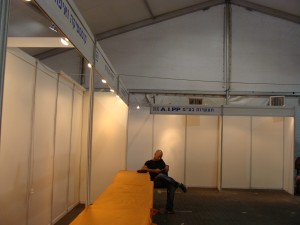
The Jerusalem Post, August 21, 2009
The crowd is small and subdued Friday morning at Tel Aviv’s Hangar 11. Drifts of Israeli Arabs and Israelis walk through an air-conditioned shuk, passing stalls lined with pickles, olives, baklawa, cosmetics, clothes, arts and crafts. One vendor—a tall, lanky man with black hair—sprays puffs of perfume in the air. “Bosem, bosem,” he says.
A makeshift stage is tucked behind the stalls. Below a green and orange sign that reads Koolanu 09 in both Arabic and Hebrew, an Israeli woman grasps a microphone, and sways as she sings a one-sentence song. “We are one, we are one,” she repeats in English.
While the turnout is thin, the names behind Koolanu 2009—a joint Jewish Arab festival of products, businesses, and culture—are not. The event has been organized and sponsored by heavy-hitters such as the Center for Jewish Arab Economic Development, The Hadassah Foundation, the UJA Federation of New York, the Authority for the Economic Development of the Arab, Druze, and Circassian sectors, the Prime Minister’s Office, and Jasmine—an organization that seeks to empower businesswomen from all sectors of Israeli society.
Like last year’s event, Echat le Echat, Koolanu is dominated by female vendors from both the Israeli Arab and the Israeli population. They sit side by side; one stall offers handmade purses with traditional Palestinian embroidery, the next offers funky, urban handbags fashioned from leather.
And at another booth, fronted by a table overflowing with colorful beaded goods, an Israeli Arab woman, her head covered in cream-colored lace, and a bare-armed Israeli woman sit together. They are Ella Yungerman and Hindia Suleman. The pair met two years ago when Yungerman , then a representative of the Ministry of Tourism, visited Suleman’s Galilee village, Bu’eine Nujediat. After seeing the handmade crafts the women of the village produced Yungerman, who speaks Arabic, launched a cultural initiative, Pninat haEmek (Pearl of the Valley). She hoped to empower the women while involving them—and the larger community—in the preservation of their unique history and heritage.
Yungerman holds up a petite triangle-shaped purse. She explains that the small green and white beaded bag is meant for liquid eyeliner and that such bags were once a common accessory for Arab women. Another example is on the table—its blue and white beads form a magen david. Not only are traditional techniques being preserved, Yungerman points out, “They are making them new.”
Though Yungerman is no longer employed by the Ministry of Tourism, she continues to volunteer her time to the women of Bu’eine Nujediat. But “in a short while they will stand on their feet,” she says.
For now the group has a venue in the Old City where Israeli tourists have been coming to learn about the local arts and crafts. “Many [Israelis] come thinking they know the culture already,” Yungerman says. “They think Arabs are Arabs. They are surprised to learn about the many different groups.” When Israelis visit the Pninat haEmek Center of Traditional Handicrafts, Yungerman says, “Friendships are born.”
Of Koolanu 2009, Yungerman remarks, “This is a goodwill event we need very much. For me, this is the future of Israel—the continuation of all these cultures.” But, noticing the low turnout, she says, “Maybe it’s too soon. Half my family was from Poland, half was from Syria,” she says. “It wasn’t easy.”
Several booths down, Ilana Adler sells wall hangings. Some are three-tiered, vibrant strips of cloth sewn together, reading “Peace”, “Hope,” or “Love” in Hebrew, Arabic, and English. “A lot of people are buying the peace one,” she comments.
Adler got her start when her daughter began teaching in the Yad beYad school in Kfar Qara. She made two wall hangings of the alphabet—one in Arabic, one in Hebrew—for her daughter’s classroom. “And I said, ‘why not make more and sell them’?” she recalls. Of her participation in Koolanu 2009, however, she says that coexistence is more of a motivation than sales.
Around the corner from Adler’s hand-tailored letters, Jerusalem-based Minerva Publishing House displays The Olive Tree Dictionary, an English-language transliteration of conversational Arabic. Minerva specializes in Middle Eastern languages—Hebrew, Arabic, Persian, and Turkish—and offers a wealth of books and materials to help Hebrew speakers learn Arabic. “We’re a non-political organization,” Adi Bavnik says, “Both sides should learn each other’s language. Then the people can decide what to do with it.”
Assaf Golani, a manager at Minerva, adds, “From a business perspective, communication is an important issue—you can’t do business if you can’t communicate. “
Is business, and a trade festival like Koolanu, a bridge to coexistence?
“Business is one step,” Golani says, “but it won’t work alone.” He gestures towards the Hebrew books, with pastoral covers and the title that suggests the reader “Learn Arabic.” “Language is a basic step towards understanding.”
But to him, Koolanu 2009 is not.
“I’m quite disappointed,” he says. “It’s like a Turkish bazaar. It’s the ‘old Middle East,’ like Edward Said.” Golani is referring to the Palestinian literary and cultural critic who coined the term Orientalism. Said’s theory of Orientalism charges that the West both condescends to and fetishizes Eastern cultures.
“The feeling of Israelis coming [to the Koolanu festival] today,” Golani continues, “is that it’s the representations of Arabs we know—selling falafel and knafeh. There are other faces to Arab commerce. There are Arab high tech companies. Where are they?”
Within sight of Minerva’s stall, children play on an indoor playground. Woven straw mats, decorated with distinctly Middle Eastern geometric designs, separate them from the concrete floor below. Pint-sized chairs and tables in a rainbow of colors invite kids to sit across from one another to color, draw, or eat. Children sit on large, brightly-hued animals while their parents and grandparents—Muslim and Jewish—look on.